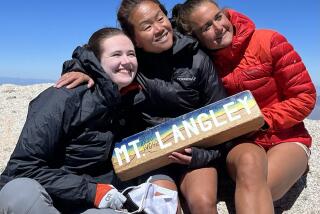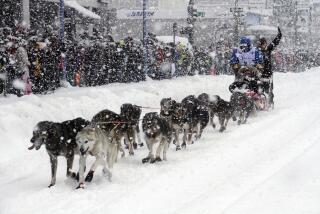Best Man on the Iditarod Is a Woman, Mushers Learn
- Share via
--A 28-year-old woman who plunged into a blinding blizzard while others stayed behind cruised into Nome well ahead of the pack of 45 other mushers to become the first woman to win Alaska’s grueling 1,100-mile Iditarod Trail Dog Sled Race. “I can’t even believe it yet,” said Libby Riddles. “I thought I had the team to do it. I didn’t know if I could keep up my end of it.” Her elapsed time for the Anchorage-to-Nome race was 18 days, 20 minutes and 17 seconds. For her victory, dog trainer Riddles earned a record prize of $50,000. The next 19 mushers will split the rest of the record $200,000 purse. She grabbed the lead three days earlier by pushing her team into a gale that nobody else dared challenge. “I left those guys in the dust,” she said triumphantly. When asked what she planned to do with her winnings, Riddles said: “Maybe Hawaii. And a box of dog biscuits for each of the dogs.”
--High school principal David Shaffer of Jamestown, Pa., said the 53 students in the “American culture” class heard an announcement over the classroom intercom that the Soviets had attacked a U.S. ship and that President Reagan would address the nation that afternoon. They were also told that classes would be dismissed early. But what they were not told until five minutes later was that the announcement was false and was the work of the instructors teaching the course. It was intended to spark discussion about world-crisis situations in preparation for the next topic, the Cuban missile crisis, Shaffer said. “We did not get that reaction. We just got blank stares that quickly told us they were scared. We just got silence.” Shaffer said that he and the other teachers conducting the course had not expected the students to assume the worst. “They did not consider conventional warfare, they did not consider possible sanctions--they went right to nuclear war,” he said. “We never said anything about nuclear war.” The students’ lengthy essays written after they discovered that the announcement was untrue disclosed the terror they had experienced in those five minutes. “They were concerned they weren’t going to get home, that they’d never see their parents again,” said Shaffer, who was the students’ age when the real Cuban missile crisis occurred. “We regretted putting them through that fear.”
More to Read
Sign up for Essential California
The most important California stories and recommendations in your inbox every morning.
You may occasionally receive promotional content from the Los Angeles Times.










